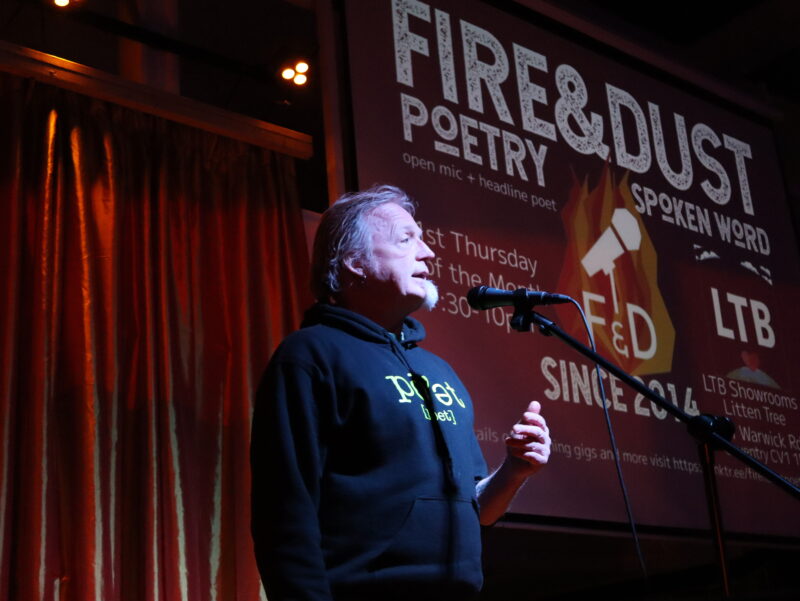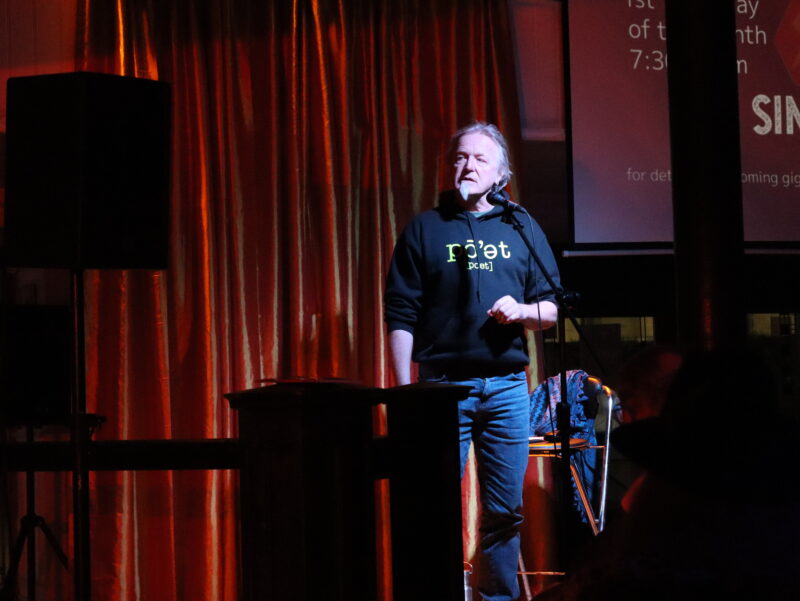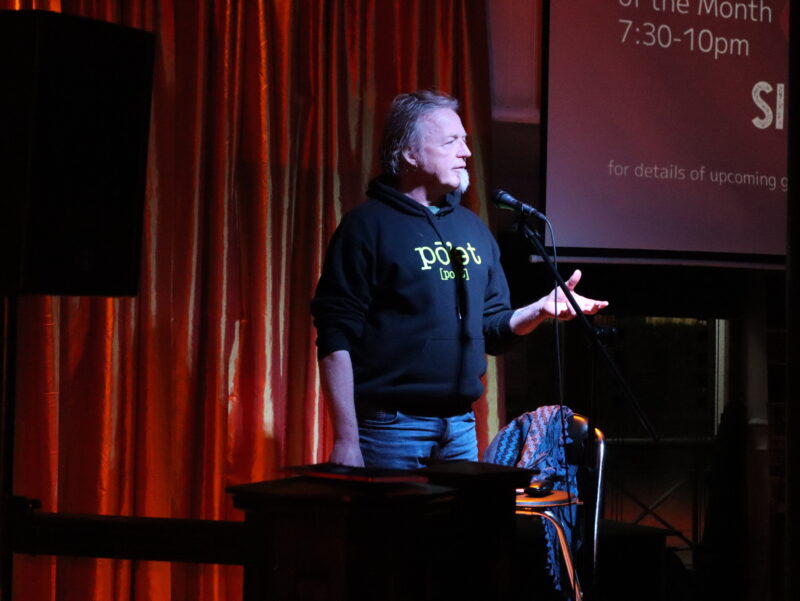INTERVIEW: FIRE & DUST MEETS STEVE POTTINGER
the lady with the market stall
is there on Wednesdays,
come shine come rain
all her goods set out on
a hundred cardboard boxes
come shine come rain
sheep’s feet, dog chews, tripe-flavoured treats, seed
for pigeons and parrots, robin and budgies
come shine come rain
the last lass gave it up for a job in a building
society, warmth of an office
come shine come rain
for the promise of sick pay, holiday pay, steady
hours, the security of wages
come shine come rain
perhaps this one’s made of sterner stuff, face lined and
smiling, hands busy with fags and matches
come shine come rain
I hope so, visit her each week for the banter
and the laughter, buy pigs’ ears for foxes
come shine come rain
–In praise of the hardiness of market traders

Steve Pottinger is a poet, author, and workshop facilitator living in the Black Country. He is one third of the Wolverhampton arts collective ‘Poets, Prattlers, and Pandemonialists’ who run spoken word events, workshops, and poetry projects across the Midlands. Steve has gigged up and down the UK, taking his irreverent, comic and political poetry to pubs, clubs and festivals, entertaining audiences from Penzance to St. Andrews. His work regularly appears online in CultureMatters, Yorkshire Bylines and the Morning Star, and has won prizes/been commended in Bread & Roses, Prole, Poetry on Loan, Plough, Guernsey International, Arran, Verve, and Poets & Players competitions. Steve’s seventh poetry collection snapshots from the fall of home was published this year by Ignite Press. He writes on subjects from the personal right through to the global, with a wild detour via outrageous dreaming.
He was our Fire&Dust headliner at The LTB on 4th February 2024. We caught up with him after the gig, to ask a few questions…
HCE: First off: we enjoyed your set for Fire & Dust! Tell us a little about your background and journey as a writer so far. What inspired you to start creating and performing poetry?
SP: I’ve been writing poetry pretty much all my life. I started as a teenager and just kept going. It was always my way of expressing thoughts I couldn’t otherwise put into words, ideas I had no other way of sharing. Sometimes it was a way of discovering what I had to say about a subject, and surprising – and educating – myself. I love that interplay between the conscious and subconscious.
At that time, I’d never thought of my poetry as being something I’d get up and perform. I was far too shy for that. But in my mid-twenties, bored and at a loose end, I gathered up my courage and went along to a local poetry group. By chance, they met in the back room of my local pub, so I knew that if it turned out to be a disaster I hadn’t got far to walk home. I was almost sick with nerves at the prospect of sharing my work with these four people sitting round a pub table drinking bitter. To my surprise, they didn’t throw me out, and – little by little – my confidence improved. One of the poets gave me a five-minute slot at an alternative cabaret night he ran, one thing led to another, and over time I discovered how much I enjoyed sharing my work with an audience and connecting with people. I still do.
HCE: Who is your work aimed at – do you have an ideal audience in mind when you’re putting a poem together?
SP: Good question. I write for myself, first and foremost. I write to get out whatever’s on my mind. I may want to capture a moment, or respond to the news, or imagine a better world. Some of these poems will be ones to perform/share with an audience, and some won’t. Either way, I craft the poem as well as I can – I think the editing process is a vitally important one – and hope that in doing that I’ve written something which will engage the people who read/hear it. I don’t like being hectored or lectured, so I aim to avoid that – performance is, in my mind, a conversation between poet and audience. Even if it’s the poet doing all the talking! I hope, ideally, that it’s a starting point rather than a destination, a springboard for people to head off where they will.

HCE: Would you say there are themes or motifs that you gravitate to in your work?
SP: I still have the old punk ethic. I grew up at a time when a lot of us took as a given the idea that the way society’s run doesn’t work for most of us, and that a wee bit of dismantling the patriarchy (and the class system) would do us all a power of good. The themes that are present – to a greater or lesser extent – in all my work are: the belief that we’re all in this together, that we all rise or fall together, and that you never, never punch down.
HCE: What messages(s) do you hope readers take away from snapshots from the fall of home?
SP: Hmmm. First, I hope they find something in there which they enjoy. Which they recognise. Which makes them feel heard, or seen, or brings the everyday to life. Which makes them laugh along. Which connects them to the world. snapshots doesn’t shy away from confronting the ugliness of the world, nor from celebrating its beauty, and I hope that in this book I’ve got that balance right.
HCE: Most of the poems in your Fire&Dust set were quite topical and focused on some hard-hitting issues, such as the situation in Gaza and mass protests in Chile. Would you say the tone of the new book is more political than your previous collections?
SP: There’s certainly politics in snapshots – there always will be in my work – but I actually think I’ve learned to apply that with a lighter touch than I maybe used to, that I’ve got better at showing, not telling. To my mind, politics is there in everything – if you can’t heat your home, or your rent is spiralling upwards, those are the result of choices made by politicians about what matters in society and who gets to make and keep money – and it’s important that there’s poetry which isn’t afraid to acknowledge that. Walking that tightrope, reflecting the world without lecturing people, is where a lot of my work spends its time.

HCE: Your Fire&Dust set was well-structured, with informative anecdotes and banter and smooth transitions. You always strike us as a confident performer with a compelling stage presence. Any tips for beginners on how to shake off the nerves and be more engaging on the mic?
SP: Thank you. I’m glad you enjoyed it! For anyone starting out, let me reassure you that we all feel nervous. That’s a normal response to getting up in front of a room of people and sharing your work. Practise at home so you know what you’re doing. Plan what you want to say between poems every bit as carefully as you write the poems themselves. Don’t worry if you make a mistake or stumble over your words – just pause, collect yourself, and carry on. Watch other poets – you’ll learn a lot from doing that. Remember it’s a learning process, a journey. And have fun.
HCE: One of the poems you performed at F&D took its title from the last line of your piece about the Chilean protest dog El Vaquita, and went in a totally different direction. Do you often engage with exercises like this as part of your writing process?
SP: That exercise came out of a writing workshop I was attending, and it was something I’d never previously thought of doing. The result – in this case – was wonderful. I think it’s always useful to bear in mind that we’re all still learning the craft of poetry, and that other poets can give us input and insights that will help drive our work forward. One of the joys of poetry, for me, is that it can take us in unexpected directions, that it surprises us and enriches our lives.
HCE: From the outside, the Black Country seems to have a thriving poetry/spoken word scene. In your opinion, is it a good place to be a writer?
SP: There’s a huge amount of talent here (and a huge amount to write about). I think, historically, we’ve been overlooked because we’re so close to Birmingham, and we’ve also been – perhaps – not quite as good at promoting ourselves and what we’re up to. We’re doing what we can to change that. In the meantime, we crack on with doing what we do, and enjoying it.

HCE: You’re a founder of the ‘Poets, Prattlers and Pandemonialists’ collective, and you guys always seem to be busy with projects! What have been some recent PPP highlights for you?
SP: I’m writing this a few days after Wolves Lit Fest, where we curate a host of events including the Fringe Room and our Stars of Slam event. That’s always a highlight of the year. Morecambe Poetry Festival (late September) is definitely another. We’re also busy with a (non-poetry) oral history project, recording the memories and experiences of people who drank in a legendary Wolverhampton rock pub. That’s proving to be hugely fascinating and a lot of fun.
HCE: What, in your opinion, do most well-written poems have in common?
SP: For me, good writing takes you out of yourself, and dissolves the boundary between you and the world. It brings connection. It surprises. It opens up possibilities. All the analysis we bring to it later – how it uses rhyme and rhythm, language and line breaks – is simply us trying to explain this magic.
HCE: What type of poetry do you seek out for personal enjoyment? As a reader/listener, when you engage with a poet’s work, what are you hoping to get out of it?
SP: I do my best to read as much poetry as possible. I want to be moved, surprised, and astonished. That can come from a poem read by a first-timer at an open-mic, sometimes more than from recognised ‘names’. For me, poetry is communication, it’s an opportunity to hear/read voices which are authentically being themselves, it’s a chance to see something familiar more clearly, or have your pre-conceptions gently challenged. I love reading poets who write in a way I could never aspire to, whose work sets me back on my haunches going ‘Wow!’
Black Country poet Emma Purshouse is astounding, and writes with insight, intelligence, and compassion about life and about our region. Luke Wright is a consummate performer. Kathryn Bevis’ work just amazes me every time I read it. I’ll stop there, because the list of poets I was coming up with just went on and on…

HCE: What’s next on the horizon for you? Are you already working on a new project/booked for upcoming performances? Likewise for ‘Poets, Prattlers and Pandemonialists’ – do you guys have a clear vision of what you want to achieve in 2024?
SP: I’ve got a string of gigs coming up to promote snapshots, which I’m really looking forward to, and I’m always ready to add more. I’ve got the beginnings of an idea for a show, too, I just need to find some free time to start work on it. This week, PPP are running the Wolves Lit Fest poetry slam, which is always a great event. Once the dust has settled on that, we’ll sit down over a pint or two and bounce around some plans for the future. There’ll undoubtedly be something wildly ambitious in the pipeline…
HCE: What’s the best way for people to keep connected with you and your work, or contact you for bookings?
SP: Social media’s proving problematic (who’d have thought that leaving it in the hands of billionaires would have drawbacks, eh?) but I’m most active on Twitter and Facebook. For bookings, it’s probably best to go via my website, but I aim to respond reasonably quickly however folk get in touch.
Twitter Facebook Instagram Website PP&P Website
HCE: Is there anything we didn’t cover that you’d like to share with our readers?
SP: Only that I’d like to sing the praises of Raef and Ann for the work they do in keeping the live poetry/spoken word scene going in Coventry. I know from our own work in the Black Country how much time and energy that involves. Respect!
Steve’s collections thirty-one small acts of love and resistance and snapshots from the fall of home are currently on offer and available online direct from publisher Ignite Press, or alternatively from other bookshops and retailers.
